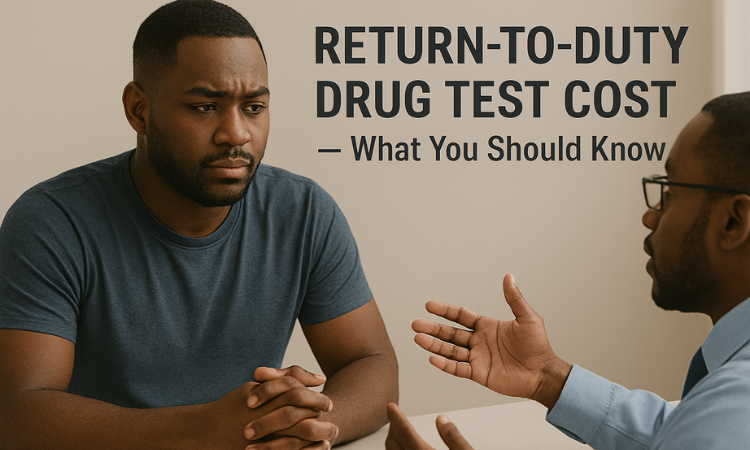The Return-to-Duty (RTD) drug test is the final and most crucial step in the DOT Substance Abuse Professional (SAP) Program. After completing the evaluation and treatment process, employees must pass this test to resume safety-sensitive duties.
In this guide, we’ll break down the average cost of RTD drug tests, what factors influence pricing, who typically pays for them, and why they’re essential for compliance with DOT 49 CFR Part 40 regulations.
What Is a Return-to-Duty Drug Test?
The Return-to-Duty drug test is a directly observed test conducted after an employee successfully completes all recommendations from the SAP.
It is required by federal law for any driver or safety-sensitive employee who has violated the DOT drug and alcohol testing program.
Key points:
- The test ensures the employee is drug- and alcohol-free before returning to work.
- It must be conducted at a DOT-certified laboratory.
- Only a negative test result allows reinstatement of duties.
This step marks the transition from the SAP process back to active employment.
Average Cost of a Return-to-Duty Drug Test
The average cost of a Return to Duty (RTD) drug test ranges between $50 and $80, depending on location, lab, and the substances tested.
Here’s a general cost breakdown:
| Test Type | Average Cost (USD) |
| 5-Panel DOT Drug Test (Standard) | $50 – $70 |
| 10-Panel Extended Test | $70 – $100 |
| Alcohol (Breath) Test | $25 – $50 |
| Combined Drug + Alcohol RTD Test | $80 – $120 |
Most employers or collection sites use the standard 5-panel DOT test, which screens for:
- Marijuana (THC)
- Cocaine
- Opiates
- Amphetamines
- PCP
Factors Affecting RTD Drug Test Costs
Several factors can influence the total cost of the Return-to-Duty test:
a. Test Type and Substance Panels
A larger testing panel (e.g., 10-panel) includes more substances, increasing the price.
b. Testing Facility or Lab
Prices vary depending on whether testing is done through a private clinic, a DOT-certified collection site, or a third-party administrator.
c. Location
Urban testing centers may have slightly higher rates due to operating costs.
d. Additional Alcohol Testing
If your SAP recommends both drug and alcohol testing, expect an additional $25–$50 in fees.
Who Pays for the Return-to-Duty Drug Test?
In most cases, the employee is responsible for paying for the Return-to-Duty test.
However:
- Some employers cover or reimburse the cost as part of their compliance program.
- If you’re part of a union or collective agreement, the employer may pay directly.
- Independent drivers and owner-operators usually pay out-of-pocket.
Always confirm payment responsibility with your Designated Employer Representative (DER) before testing.
How the RTD Test Fits into the DOT SAP Process
The Return-to-Duty test is the final step of the DOT SAP Program.
Here’s how it fits into the process:
- SAP Evaluation — Assessment of violation
- Treatment or Education Program — Completion of recommended steps
- Follow-Up SAP Evaluation — SAP confirms readiness to test
- Return-to-Duty Drug/Alcohol Test — Must result in a negative test before reinstatement
- Follow-Up Testing Plan — Random or scheduled testing post-return (up to 5 years)
Without a negative RTD test, the employee cannot resume safety-sensitive functions such as driving or operating heavy equipment.
Follow-Up Testing After Return-to-Duty
After returning to work, employees are placed in a Follow-Up Testing Program, which includes:
- At least six unannounced tests within the first 12 months
- Ongoing testing for up to five years
- Direct observation for all follow-up tests
Each test typically costs $50–$70 and may be paid by the employer or employee, depending on company policy.
Tips for Managing RTD Testing Costs
- Choose a DOT-approved lab — ensures compliance and avoids retesting costs.
- Ask about bundled pricing if completing multiple tests.
- Keep payment receipts for documentation and reimbursement purposes.
- Confirm employer policies before scheduling the test.
Being proactive about cost and compliance helps prevent unnecessary delays in your return-to-duty timeline.
Conclusion
The Return-to-Duty drug test is an essential and final requirement for employees returning to safety-sensitive work after a DOT violation. While the average cost ranges from $50 to $80, understanding who pays and what factors influence pricing ensures financial and procedural clarity.
Successful completion of this step restores your eligibility to work marking the end of your SAP process and the start of a compliant, substance-free career path.
Related Resources
Continue exploring the DOT SAP Program with these helpful guides:
- How the DOT SAP Program Works: Process, Rules, and Requirements
- What Is the Cost of the DOT SAP Program?
- Who Is Responsible for Paying the DOT SAP Program Fees?
- DOT SAP Evaluation Fees Explained: Typical Pricing and Factors
- Does Insurance Cover the DOT SAP Program?
- Becoming a DOT SAP: Qualifications, Training, and Certification Process

